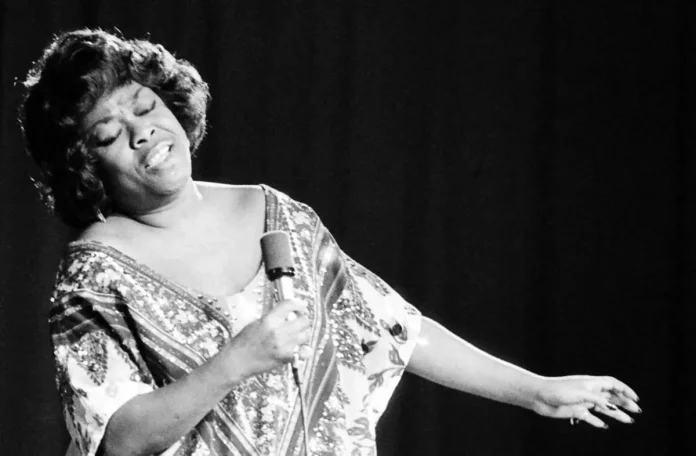This is a bumper year for centenaries and although I hope to cover several, I doubt if any will give me more pleasure than this one, featuring a singer I saw and heard live, in my late teens, on the stage of a large city-centre Odeon cinema. She was accompanied by a British group known as The Jazz Couriers, so the longer in tooth amongst you will know that I’m not talking about yesterday, or even the day before.
The lady herself was born 27 March 1924 in Newark, New Jersey, and christened Sarah Lois Vaughan, which puts her in her early 30s when she blew me away, from the third row of the stalls, smack dab into the land of Oo-Blah-Dee, and how she got from Brunswick Street, Newark, New Jersey, to Oxford Street, Manchester, Lancashire, has to be worth the odd few hundred words.
Back in Newark, Sarah began studying piano aged seven and by her teens she was sufficiently accomplished to play, albeit illegally, in Newark’s small clubs. From around 18, and accompanied by a friend, Doris Robinson, she started to venture into Manhattan. On one of these forays she persuaded Robinson to enter a talent contest at the Apollo. With Sarah accompanying her on piano Doris copped second prize. Naturally shy, the teenage Sarah allowed this to boost her confidence, and, in her own good time, she returned to the Apollo, entered another contest, and let out a rendition of Body And Soul that not only blew everyone away, but earned her the first prize of $10 plus a week’s engagement at the venue. Thus, at a stroke, she embarked on a career that lasted from 1942 until 1990, accruing nine nominations and two Grammys along the way.
While working out her prize-winning week at the Apollo, she was introduced to bandleader Earl Hines and his current male singer, Billy Eckstine and as a result she was hired by Hines on 4 April 1943. Initially she was the band’s pianist and vocalist but later, when Hines signed Cliff Smalls as trombonist and pianist, she “downsized” to vocalist only. The fact that she could hold down the piano chair in a band like Hines’ is testimony to a second string to her bow that is often overlooked.
At this time, of course, a new sound, bebop, was gestating, and with Dizzy Gillespie, Charlie Parker – on tenor – and Benny Green amongst the sidemen, the Hines outfit was right at the forefront of the movement. Eckstine left the band in late ’43 to form one of his own, and the following year he invited Sarah to join him, which she was happy to do, if only because it gave her the chance to cut her first disc, I’ll Wait And Pray (me neither) on 5 December of that year.
Soon afterwards, feeling she was now ready, she left Eckstine and segued into a solo career that would take her to the topmost branch of a very prestigious tree whose branches included Billie Holiday, Ella Fitzgerald, Anita O’Day and Peggy Lee, to name only four. It wasn’t alas, all roses; like many A-list female vocalists, she was visited in the cradle by a fairy godmother, who leaned over and whispered in her ear “Here’s how it is, kid; I’m prepared to lay a set of pipes on you, that’ll put you right there in the pantheon, but, like the man said, you gotta win a little, lose a little, so, your domestic life is gonna be a car crash, one that’ll make Helen Keller feel like Rebecca of Sunnybrook Farm.” Which is perhaps why, for every Broken-Hearted Melody there was a George Treadwell, for every Tenderly a Clyde Atkins, for every Serenata a Waymon Reed; Three At Bats, Three Strike Outs.
She remained close to Billy Eckstine, performing several duets with him, which were popular in the UK, none more so than Passing Strangers, which charted on both sides of the pond, but she also recorded with other prominent artists such as Clifford Brown, Count Basie , Dizzy Gillespie, Mundell Lowe, George Duvivier, Oscar Peterson, Ray Brown, Louis Bellson, Barney Kessel and Joe Pass. And if we’re looking for something that set her apart from the herd, she’s arguably the only A-list performer who could have sung the poetry of the man who became Pope John Paul II. The nickname “The Divine One” was bestowed on Sarah in 1949 by Dave Garroway, a disc jockey working out of Chicago. The title “Pope John Paul II” was bestowed on Karol Jozef Wojtyla in 1978, by The College of Cardinals, working out of Rome, and in both cases the titles remained with the subjects throughout their lives. In his youth Karol had written several poems in his native Polish; translated into English, they were turned into lyrics by Gene Lees, arranged by Lalo Schifrin, and performed by Sarah on an album titled The Planet Is Alive… Let It Live, in 1984.
For someone so consistently popular she didn’t spend much time in the charts, and the successes she did have – Serenata, Broken-Hearted Melody – were more nine-day wonders than extended favourites à la June Christy’s Something Cool, Peggy Lee’s Fever, Ella’s Ev’ry Time We say Goodbye, Jo Stafford’s You Belong To Me, etc. This makes it all the admirable that she was able to sustain an international career, enduring for over half a century, built entirely on a set of pipes to die for. Eat your heart out, Pan.
















